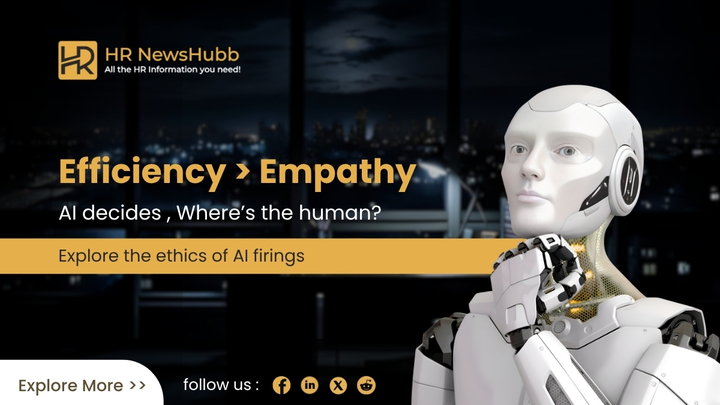-
HR Technology & Automation
HR’s New Smartest Colleague: What Happens When AI Becomes a Team Member?
Forget the notion of HR tools as assistants; they’re now becoming colleagues. From AI agents that ...
September 8, 2025
-
Recruitment Trends & Strategies
The New Hiring Scam: “Resign First, Offer Later” — A Trap Too Many Are Falling Into
Imagine this: You’re offered a dream job—better pay, bigger title, exciting growth. The recruite...
August 25, 2025
-
Interview Tips & Resume Advice
The Hidden Gatekeeper in Modern Hiring
In the digital age, the hiring process has undergone a seismic shift. What once involved stacks of p...
August 17, 2025
-
HR Essentials
When Boundaries Blur: A Cautionary Tale from the Astronomer Scandal
In the ever-evolving landscape of tech startups, where ambition often outpaces accountability, a rec...
August 11, 2025
HR Essentials

When Boundaries Blur: A Cautionary Tale from the Astronomer Scandal
In the ever-evolving landscape of tech startups, where ambition often outpaces accountability, a recent scandal at Astronomer, a rising data

The Rise of Emotional Intelligence in Leadership Amid AI Disruption
Why Leading with Empathy Is No Longer Optional A quiet but profound shift is unfolding in today’s corporate corridors. While

Talent Strategies for an Expanding Sector
The infrastructure sector is witnessing unprecedented growth, spurred by urbanization, technological advances, and large-scale projects. This rapid evolution has created

The Role of HR in Shaping Organizational Culture
Introduction: Organizational culture is the invisible glue that binds teams, defines values, and sets the tone for productivity and collaboration.

Employee Well-being in the Hybrid Work Era: Strategies for HR Leaders
In today’s dynamic work environment, the hybrid work model has become the new norm. As organizations blend remote and in-office
HR Technology & Automation

HR’s New Smartest Colleague: What Happens When AI Becomes a Team Member?
Forget the notion of HR tools as assistants; they’re now becoming colleagues. From AI agents that independently tackle tasks to

“ChatGPT Told Me I’m Fired”: The Rise of AI in HR Sparks Ethical Uproar
A New Kind of Pink Slip Imagine walking into work, coffee in hand, only to be told your role has

HumanifyAI: Leading Change in the AI-Driven Workplace
Introduction: The AI Revolution in HR The workplace is undergoing a seismic shift, driven by artificial intelligence. Automation is streamlining

The Rise of Intelligent Talent Management
Shaping the Future of HR with Intelligent Talent Management The world of human resources is being transformed at its core.

The Integration of HR Tech and Cloud-Based Solutions
Introduction The landscape of HR operations has experienced significant disruption in recent years, fueled by technological advancements and the need
Interview Tips & Resume Advice

The Hidden Gatekeeper in Modern Hiring
In the digital age, the hiring process has undergone a seismic shift. What once involved stacks of printed resumes and face-to-face evaluations has now been streamlined by algorithms and automated systems. Artificial intelligence (AI) has become the silent gatekeeper, scanning resumes with precision and speed that human recruiters could never match. But with this efficiency comes a troubling question: Are these systems truly fair? AI resume screening tools, now widely adopted across industries, promise to eliminate human bias and accelerate recruitment. Yet, beneath their polished interfaces lies a complex web of assumptions and historical data that may be quietly perpetuating discrimination.
The Illusion of Objectivity
At first glance, AI seems like the perfect solution to the inefficiencies of traditional hiring. It can process thousands of applications in seconds, identify patterns, and rank candidates based on predefined criteria. But the foundation of these systems is built on data that reflects past hiring decisions, many of which were shaped by unconscious bias. When algorithms are trained on historical hiring trends, they learn to replicate those patterns. If a company has historically favored candidates from certain backgrounds, the AI may internalize that preference. The result? Resumes from equally qualified individuals may be dismissed simply because they don’t align with the algorithm’s learned expectations.
This isn’t just a technical flaw; it’s a systemic issue. The very tools designed to democratize hiring may be reinforcing the same barriers they were meant to dismantle.
The Unseen Consequences
For job seekers, the impact is profound. Many never realize that their resumes are being filtered out before a human ever sees them. Their qualifications, experience, and potential are reduced to data points that may not fit the algorithm’s mold. This silent rejection can be especially damaging for individuals from underrepresented communities, whose career paths or educational backgrounds may differ from the “norm” encoded in the system. Organizations, too, suffer from this blind spot. By relying heavily on automated screening, they risk overlooking exceptional talent and narrowing the diversity of their workforce. Innovation thrives on varied perspectives, and when hiring becomes homogenized, creativity and progress can stagnate.
Rethinking the Role of AI in Recruitment
To move forward, companies must confront the limitations of their technology. Transparency is key. AI systems should be regularly audited to ensure they are not inadvertently discriminating against certain groups. This means opening the black box and examining how decisions are made, not just trusting the output. Equally important is the data used to train these systems. It must be inclusive, representative, and reflective of the diverse world we live in. Without thoughtful curation, algorithms will continue to echo the biases of the past. And perhaps most critically, human oversight must remain central. AI should assist recruiters, not replace them. The final decision should always involve human judgment, one that considers context, nuance, and the intangible qualities that no algorithm can measure.
Why This Conversation Matters
This isn’t just a technical debate; it’s a human one. The future of hiring depends on our ability to balance innovation with integrity. As professionals, job seekers, and leaders, we must demand systems that are not only efficient but also equitable. Understanding the risks of AI bias is the first step. Acting on that knowledge is the next.
Stay Ahead of the Curve
This platform is dedicated to empowering professionals with insights that matter. If you’re passionate about building a fairer, more inclusive hiring landscape, our newsletter is for you. Each edition delivers expert perspectives, practical strategies, and deep dives into the evolving world of recruitment.
Subscribe now and join a community committed to change
A Future Worth Building
Technology will continue to shape the way we work and hire. But it’s up to us to ensure that progress doesn’t come at the cost of fairness. Every resume represents a story, a journey, a person. Let’s make sure those stories are heard, not filtered out by flawed systems.
Together, we can build a future where hiring is not just smart, but just.
References
- Brookings: Gender, race, and intersectional bias in AI resume screening
- University of Washington: AI bias in resume screening
- Peoplebox: Bias in AI Resume Screening
- Iowa State University: Automated Resume Screening Study
Recruitment Trends & Strategies

The New Hiring Scam: “Resign First, Offer Later” — A Trap Too Many Are Falling Into
Imagine this: You’re offered a dream job—better pay, bigger title, exciting growth. The recruiter sounds convincing, the hiring manager is enthusiastic, and everything feels right.

Data-Driven Hiring: The New Standard for Recruitment Success
The New Age of Recruitment: When Data Meets Human Potential A few years ago, hiring decisions were still heavily based on resumes, interviews, and a


